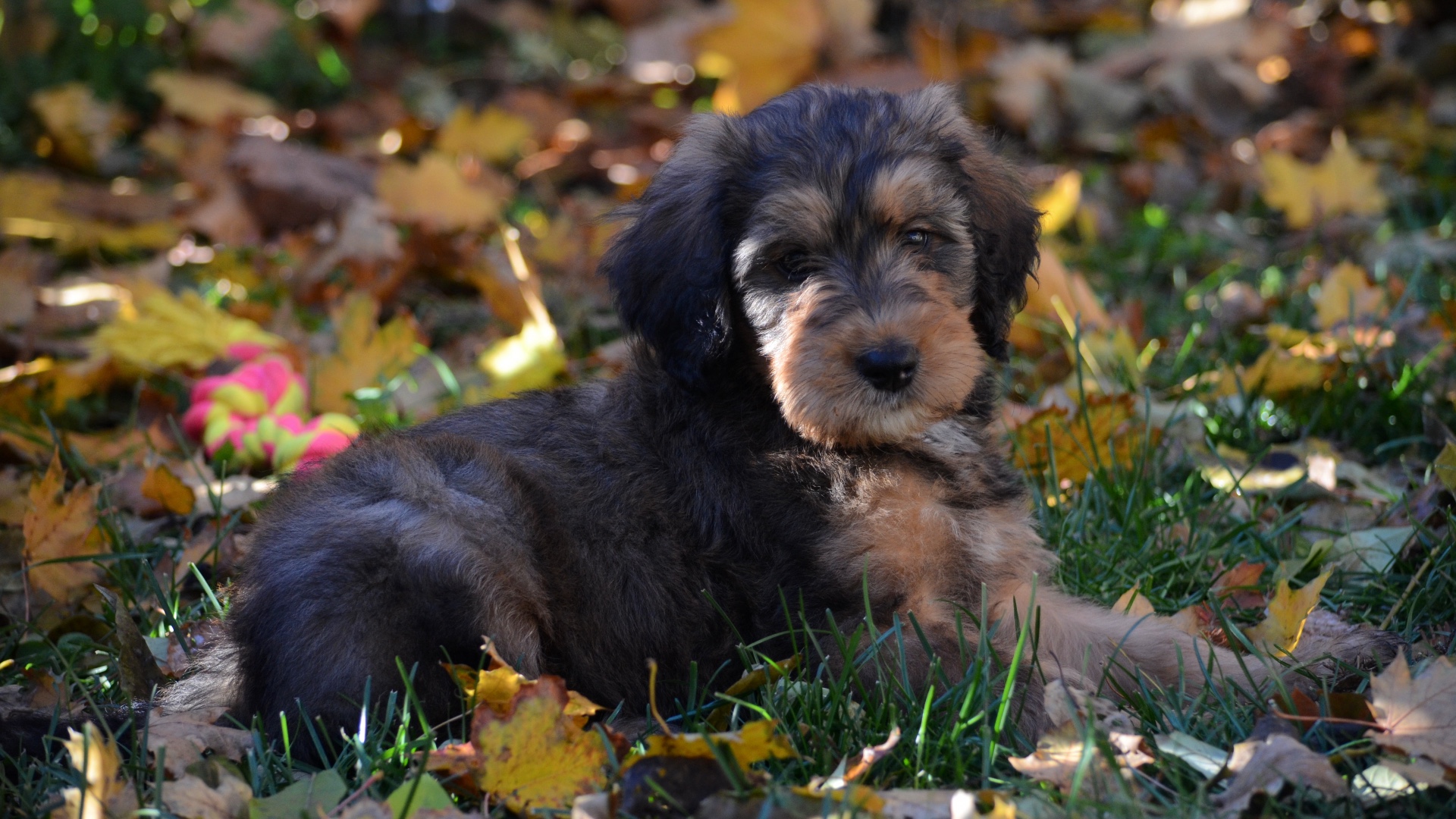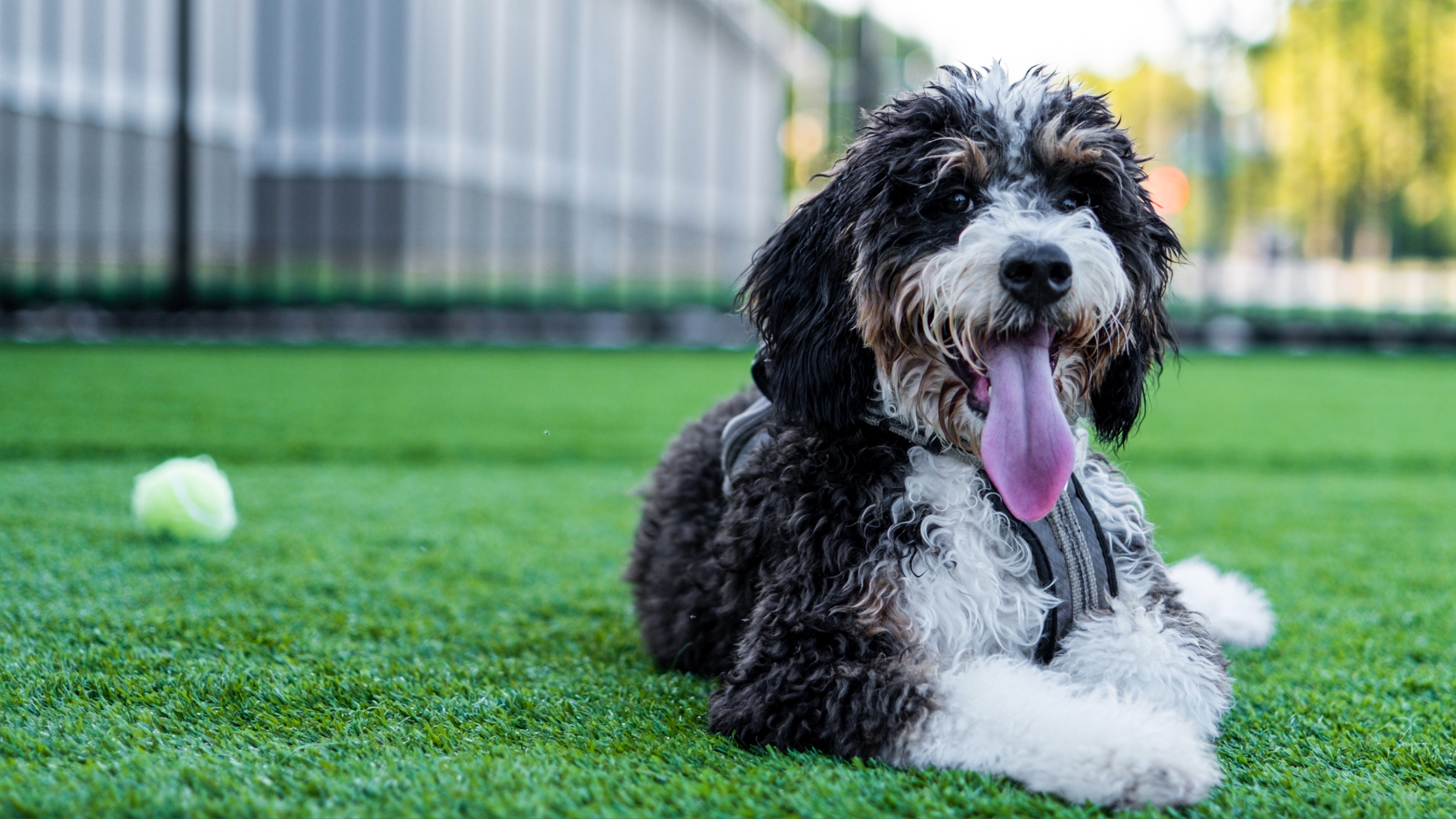Bernedoodle: Breed profile
Goofy, devoted and super affectionate, the bernedoodle makes a wonderful family companion

Thinking of welcoming a bernedoodle into your family? We don't blame you! These adorable pups don't just have faces that make you want to cuddle them all day, they also have lovely natures that make them a joy to have in the home.
There are so many positives about owning a bernedoodle – not least how easy to train they are. You'll find the intelligent and eager-to-please bernedoodle picks up new tricks, skills and behaviors super quick.
And when it comes to improving your relationship with your dog, you'll find the loyal, affectionate and devoted bernedoodle bonds deeply with you and every other member in their new home, meaning regular quality time together and lots of exercise will go a long way in ensuring you have a friend for life.
To help you decide whether this poodle crossbreed is the right fit for you and your family, we turned to expert vet Dr. Lily Richards who was more than happy to fill us in on everything you need to know about this sweet-natured breed.
What is a bernedoodle?
A cross between the bernese mountain dog and the poodle, the bernedoodle is a relatively new breed that was established in 2003. Since then, they have become super popular thanks to their gentle, sweet natures and incredibly bright minds.
Bred solely for companionship, the bernedoodle is loving, affectionate, and will be more than happy to lap up as many cuddles as you can give it. Equally at home on a hiking trail as they are curled up beside you on the couch, the bernedoodle is never happier than when they're with their favorite humans.
How much exercise does a bernedoodle need?
"Depending on the cross of poodle, standard, mini, or toy, bernadoodles can range in size and therefore exercise requirements," explains Richards. "Larger dogs need more exercise than their smaller counterparts.
Get the best advice, tips and top tech for your beloved Pets
Overall their requirements are considered moderate, with regular walks, playtime and mental stimulation needed to keep them healthy and happy. They are active but adaptable so even the larger of the breed can live in smaller accommodation with the right exercise regime."
Because bernedoodles need a moderate amount of exercise in order to maintain a happy and healthy lifestyle and adore activities like hiking, swimming and running, they're great for families who love outdoor activites.
In fact, bernedoodles are one of the best dogs for hiking and make wonderful companions overall for all sorts of endurance-related activities. But that doesn't mean they won't be equally happy with a good 60-minute walk each day. You can check out these ways to have more fun with your dog on walks for inspiration on how you can mix things up and keep those strolls interesting.
Bernedoodle puppies are especially energetic and if they aren't given proper playtime they can get destructive – they're especially fond of excessive chewing, so keep an eye out and consider investing in some of the best dog chew toys.
Are bernedoodles easy to train?

The mix of the poodle and bernese mountain dog means most bernedoodles should be easy to train. Poodles are bright and can easily learn tricks and good behavior, while bernese mountain dogs are intelligent working pups. Training a bernedoodle should include potty training, leash training, and listening and obeying, as that will make for an especially well-behaved doodle.
Be patient, and use positive reinforcement training methods to ensure your bernedoodle will be a happy and well-behaved pup. Positive reinforcement for dogs involves giving a reward in return for a dog's correct behavior, which can be anything from sitting, staying, or ceasing a bad behavior. That reward can be food based in the form of treats, a fun bout of playtime, or praising and lots of pets.
If you feel you'd benefit from some extra support when it comes to training your bernedoodle, we recommend reaching out to a professional trainer or behaviorist for advice and guidance. Or if you'd prefer to fly solo, these practical tips for training your dog on your own can serve as a helpful starting point.
Are bernedoodles good with kids?
Bernedoodles are great with kids, making them one of the best dog breeds for families. Many people find that they are especially fond of younger kids. Sweet-natured with babies and the elderly, but energetic enough to play with teenagers, bernedoodles are a great pet that can grow up alongside your children, as they're ideal matches for both young and old.
"Bernedoodles are known for their fun-loving, outgoing personalities, and sharp minds; the best of both worlds from their bernese mountain dog and poodle ancestry. They are considered gentle, kind, sociable, affectionate, goofy, clowns whilst loyal and devoted. With good consistent training, they are a great addition to any family," says Richards.
What do Bernedoodles eat?
Toy and mini bernedoodles should be fed a diet that's specially formulated for small-breed dogs. A standard bernedoodle should eat food that's made for a large breed.
"A complete diet appropriate for their life stage and expected adult size should be fed," Richards confirms. "If your bernedoodle eats rapidly, a slow feeder or smaller meals given throughout the day should be considered to prevent complications such as GDV."
As always, giving your bernedoodle higher quality meals is a great way to ensure they stay happy and healthy from puppyhood up through adulthood.
Are bernedoodles prone to barking?

If you're after a relatively quiet life, the bernedoodle could well be the pup for you. Unlike some breeds that are known for being vocal, bernedoodles aren't known for barking excessively.
In fact, bernedoodles tend to make terrible guard dogs as they're friendly, gentle and don't often feel the need to bark. However, they can have rather loud and authoritative barks when they get going, so if they do decide to bark they may startle you.
Oftentimes excessive barking is a sign of pent-up energy, so if you find your dog won't stop barking for no reason, they may just need to go for a swim or on a good run.
Are bernedoodles aggressive?
Bernedoodles don't tend to have aggressive behavior, especially if properly trained from a young age. Many people refer to Bernedoodles as gentle giants, and since they are good with kids they don't tend to be aggressive. However, keep in mind that any dog can get aggressive no matter the breed, and it is all about proper training and keeping an eye out for any underlying medical conditions that may cause a dog to lash out.
Since Bernedoodles are good with both people and other dogs, though, it's unlikely that you'll see a Bernedoodle getting aggressive. Unlikely doesn't mean impossible, however, so keep that in mind when training your 'doodle.
Do bernedoodles shed a lot?

There are technically different crosses of bernedoodle that can result in different shedding types: the F1, F1b, and F2. The F1 is a 50/50 split between the bernese mountain dog and poodle, and are considered the healthiest. The F1b is 25% bernese mountain dog and 75% poodle, and are the least likely to shed — and may even be entirely non-shedding. The F2 bernedoodle is the result of breeding two bernedoodles, and they may have a different coat.
The majority of bernedoodles have a wavy coat like a poodle and therefore will not shed, while a wavier-coated doodle will have an increased likelihood of shedding. If you're looking for a hypoallergenic dog breed, the bernedoodle may be a good choice – although Dr Richards issues a word of caution.
"Bernedoodles are a low shedding, low allergen breed which has given them a reputation as a “hypoallergenic” breed, however while those with allergies to dog dander will find this breed less reactive, no dogs are truly hypoallergenic."
Overall, a good brush two to three times a week will help keep your bernedoodles coat free from mats and tangles.
Wisdom Panel Breed Discovery DNA Kit | Amazon
Not sure exactly what breed your dog is? This kit screens for 365+ breeds – because knowing every detail about your dog helps you understand how best to care for them.
Bernedoodle health problems
"Bernadoodles can suffer from any of the congenital diseases found in their ancestry from the bernese mountain dog or poodle," explains Richards.
"The larger of the breed especially can suffer from health issues so a full family history should be attained before breeding and any necessary screening should be undertaken as necessary.
Hip and elbow dysplasia are the main orthopaedic inherited disorders that pain this breed whilst Progressive Retinal Atrophy (PRA) and hereditary cataracts can affect their eyesight eventually leading to blindness. Allergies aren’t uncommon in this breed also.
The larger of the breeds can develop GDV (gastric dilation and volvulus) just as any deep chest breed so precautions should be taken after meals before exercise."
The Complete Guide to Bernedoodles | Amazon
If you want to learn more about the bernedoodle, this book has got you covered. Featuring training and socialization strategies, food tips, and health care advice, you'll be a bernedoodle expert before you know it!
Looking for more great bernedoodle content? Here are some berendoodle facts you might not have heard before.

Dr. Lily Richards is a vet with 11 years of experience in farm, equine, small animal and exotic pet care. After running a busy clinic she took a step into client education focusing on getting the right information to those that need it and are searching for help and advice from professionals online.

Kathryn is a freelance writer who has been a member of the PetsRadar family since it launched in 2020. Highly experienced in her field, she's driven by a desire to provide pet parents with accurate, timely, and informative content that enables them to provide their fur friends with everything they need to thrive.
Kathryn works closely with vets and trainers to ensure all articles offer the most up-to-date information across a range of pet-related fields, from insights into health and behavior issues to tips on products and training.
When she’s not busy crafting the perfect sentence for her features, buying guides and news pieces, she can be found hanging out with her family (which includes one super sassy cat and a kitten), drinking copious amounts of Jasmine tea and reading all the books.
She has written for a range of publications, including Fit&Well, Top Ten Reviews, LiveScience, Goodto, and Product Hunt.


